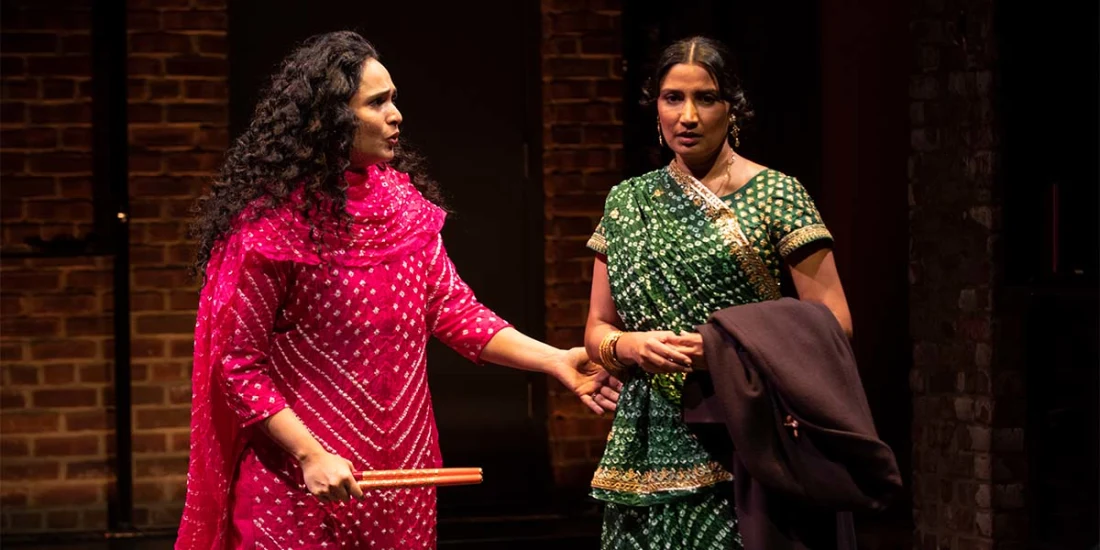'Elyria' review — a family confronts the future on a journey to the past
Read our four-star review of Elyria, written by Deepa Purohit and directed by Awoye Timpo, running off Broadway at the Linda Gross Theater through March 19.
Playwright Deepa Purohit has had an unconventional career: Before co-founding a theatre company, she taught in public schools, opened a consulting business, and got a master's in public health from Columbia. These experiences gave her the insight to pen Elyria, a tale of the Gujarati diaspora in 1982 Ohio, now playing at Atlantic Theater Company's Linda Gross Theater. Elyria is a coming-of-age story that investigates what happens when class and community prevent adults from coming into their own.
The play opens with choreography from Parijat Desai as two estranged friends, the no-nonsense Vasanta (Nilanjana Bose) and the restrained Dhatta (Gulshan Mia), collide at a Hindu festival. They are from the same place — a small town in what is now Kenya, home to many people of Gujarat, India — and are in the same place now: a small town in Ohio, a fact Dhatta thinks can’t be a coincidence. They have the same past, and they share the same secret. But they are not the same.
Haunted by ethereal younger versions of themselves, Vasanta and Dhatta must navigate their families and their new reality without stumbling too far down the road to the past. Elyria’s script has some predictable beats, but they are interrupted and invigorated by bursts of dance theatre that speak louder. A young Dhatta (Avanthika Srinivasan) forces the older one to confront the guilt that has forced its way from her body. Later, a young Vasanta (Mahima Saigal) puts pain into motion when the men in her life deny her agency.
Her husband Shiv (Sanjit De Silva, Purohit’s husband and frequent collaborator), an aloof wannabe businessman, is desperate to reclaim his masculinity by minimizing Vasanta’s power. Meanwhile, Dhatta’s husband Charu (a heartbreaking Bhavesh Patel), a surgeon who has only ever wanted to do right by his family, is the only one with the power to give Vasanta what she wants. Charu’s attempts at resistance are no match for Vasanta, who notes that American women “don’t feel it’s necessary to ask permission from the men to do what they want to do.” She has big hair and bigger resolve.
Little grounds Elyria in the world of 1982 save the new wave music championed by Hassanali (Omar Shafiuzzaman), a high-energy British college student who bursts into the life (and dance troupe) of Rohan (Mohit Gautam), Dhatta and Charu’s ambitious son. The boys have the most compelling chemistry of the play’s many pairings, and they refuse to bow to their world’s many reasons to tear them apart.
The fact that Hassanali is Muslim makes for a few awkward introductions, but it’s clear his relationship with Rohan is more intense than most. Rohan has been plagued by the feeling that something in his life is missing. Hassanali is the first person to tell him to find it.
It is disappointing that Elyria rushes to its ending soon after Rohan and Vasanta set their sights on uncovering their personal truths. The ending ushers in changes of heart that don’t feel justified and mar an otherwise compelling story. Still, Awoye Timpo’s fluid production is not to be missed, and its ghosts will haunt you after the lights go down.
Elyria is at the Linda Gross Theater through March 19. Get Elyria tickets on New York Theatre Guide.
Photo credit: Nilanjana Bose and Gulshan Mia in Elyria. (Photo by Ahron R. Foster)
Originally published on
